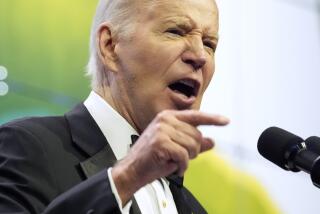Iraq Trying to Buy 4,000 Russian Tanks, Defector Tells U.S. Officials : Mideast: Moscow denies claim. The sale would boost the quality of Saddam Hussein’s forces in the region.
- Share via
WASHINGTON — Iraqi defector Lt. Gen. Hussein Kamel Majid has told Western intelligence that Iraq is trying to buy 4,000 sophisticated tanks from Russia to rebuild its army after serious losses during the 1991 Persian Gulf War, according to U.S. officials.
Russian authorities have denied the claim. “Nothing of the kind is going on,” said Valery V. Kartavtsev, deputy chief of Rosvooruzheniye, the state enterprise with sole authority to produce, market and sell Russian arms.
But even before Majid’s claim, Washington anticipated that Moscow and Baghdad would engage in arms negotiations with an eye on a formal sale as soon as U.N. economic sanctions are lifted, the sources said.
Sale of the 4,000 T-72s and T-80s, delivered over a period of several years, would restore the quantity of tanks Iraq had before the war. It would also significantly improve the quality of Baghdad’s forces, because the tanks are among the most advanced in the world, U.S. officials contend.
“Iraq would then have the largest tank fleet in the Middle East, which would in turn change the strategic balance of power in the region,” a senior Pentagon official said.
Iraq’s tank fleet, which now numbers about 2,200, according to the International Institute for Strategic Studies in London, would leapfrog ahead of Syria, now the Middle East leader with about 4,500 tanks. Not far behind are Israel with 4,000 and Egypt with 3,167.
The multibillion-dollar deal is critical for Russia, because payment could be in the form of either hard currency or oil. Also, the Pentagon says Russia’s tank industry is in trouble and cannot be sustained in the long term unless it generates sales, and big ones.
“This would be a big event for Moscow and possibly determine whether the tank industry is viable or not,” a senior U.S. official said.
“[Majid’s] claims smell absolutely right to us.”
Since the Soviet Union’s collapse, Moscow has suffered a sharp drop in arms sales and delivery. The Kremlin provided as much as $20 billion a year in military hardware to foreign countries during the 1980s, when it supplied half the global market. Last year, its share fell to 7% with sales of $1.7 billion.
U.N. sanctions on Iraq and Libya have cut off Russia’s two best sources of hard-currency arms sales, in turn intensifying friction between Moscow and Washington, according to Dmitry V. Trenin of the Russian-American Commission on Conventional Arms Proliferation.
At a time when stable, developed nations are not expanding their armed forces, Russia may feel pressure to engage in lucrative trade with rogue powers despite sanctions, Western diplomats and defense analysts warn.
A major arms deal would help explain why Russia--along with France and China, for separate economic reasons--have been pushing hard for more than a year to ease sanctions. The Clinton Administration has refused to consider any modification of the crippling embargo. It has also insisted that an end to economic sanctions does not mean an open door for new arms sales.
When pressed, Russian officials claim that there is nothing wrong with talking and that no resolutions prohibit discussions, provided nothing is done until U.N. sanctions are lifted. “Consultations and negotiations would not themselves be a violation,” Kartavtsev said.
*
He also rebutted Majid’s claim by noting that Russian defense industries would need years to manufacture 4,000 tanks. He derided the quantity as “an insane number.”
“Four thousand tanks would leave no space for Iraqi cars and camels to pass around them,” Kartavtsev added.
But Pentagon officials have independently confirmed Majid’s claim that a leading Iraqi general has been talking to Russian arms dealers in Moscow over the past month. The defector, the former head of Iraq’s military industrialization organization who visited Moscow earlier this year, was familiar with the deal because he was part of the initial negotiations, U.S. officials say.
Securing work for Russia’s withering military industrial complex is now a primary objective in the government’s campaign to boost arms sales by at least 50% this year.
Russia’s general push for more conventional arms trade reflects the leadership’s commitment to protect as many of the 6 million remaining defense jobs as possible during the country’s turbulent economic transition.
*
Russia’s increasing disregard of U.S. apprehensions over arms and technology sales to countries hostile toward the West is illustrated by Moscow’s insistence on selling $1 billion in nuclear reactor technology to Iran.
Washington has repeatedly warned that the sale could provide Tehran, which it accuses of sponsoring terrorism, with the means to produce nuclear weapons. But cash-strapped Russia has defied international pressure to back off the deal.
The tank sale could also be a means of resolving a critical debt issue. Iraq’s ambassador to Russia, Hassan Fahmi Jumah, said last month that sanctions against Baghdad had cost Russia $43 billion, including $20 billion from unfulfilled trade and oil contracts.
Wright reported from Washington and Williams from Moscow.
More to Read
Sign up for Essential California
The most important California stories and recommendations in your inbox every morning.
You may occasionally receive promotional content from the Los Angeles Times.














